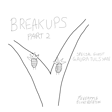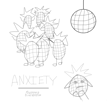
Work Life Balance
We all struggle with work-life balance, whether you’re in school, in the corporate world, or working for yourself. We live in a world that encourages a relentless pursuit of increased productivity over fulfillment and this idea that we need to get somewhere (faster) so we can be okay. Join us as we discuss the intricacies of work life balance and how we’ve navigated it so far.
Art Pick of the Episode
Ahir: Blood Meridian - A book “that dwells on the worst evils, written in prose with the beauty of an angel,” which explores one question: how can goodness matter in a world where it can be annihilated at any moment by overwhelming violence
https://www.goodreads.com/book/show/394535.Blood_Meridian_or_the_Evening_Redness_in_the_West
Devam: New Normal - Finally some good representation! A playful Indians-in-the-Bay-Area sitcom written and directed by my college bud Vivek Menon that the whole family can enjoy. Share it with your friends and parents!
https://www.youtube.com/watch?v=7dGhu7ORS-0&pp=ygUYbmV3IG5vcm1hbCBpbmRpYW4gZmFtaWx5
Books Referenced
Quarterlife - https://www.amazon.com/Quarterlife-Search-Self-Early-Adulthood/dp/0525511660
Credits
"Vibing Over Venus" Kevin MacLeod (incompetech.com)
Licensed under Creative Commons: By Attribution 4.0 License
http://creativecommons.org/licenses/by/4.0/
"Midnight Tale" Kevin MacLeod (incompetech.com)
Licensed under Creative Commons: By Attribution 4.0 License











